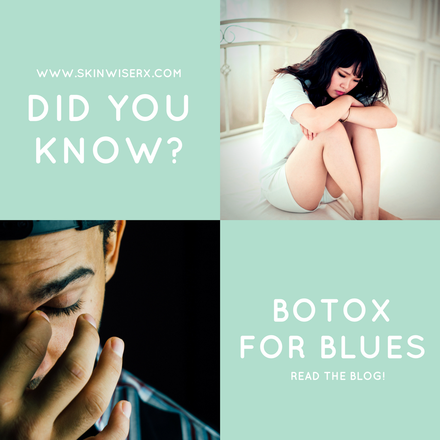Botox CAN Help the BluesSeveral studies suggest that the inability to frown caused by Botox makes people happier. Psychologists at the University of Cardiff in Wales showed that healthy people who had cosmetic Botox injections were happier and less anxious than those who hadn’t (Lewis & Bowler, 2009). In an experiment by German researchers, healthy people were asked to make an angry face while their brains were being scanned by a functional MRI. Those who received Botox injections had much less activation in areas of the brain that process emotions than those who had no injections (Hennenlotter, Dresel, Castrop, Ceballos-Baumann, Wohlschlager, & Haslinger, 2009). It is theorized that those that cannot make an active angry face feel less angry. A feedback loop is disrupted and thus the intensity of emotion is disrupted. Another U.S. study at the University of Wisconsin found that by blocking the body’s natural movement an effect is made on emotion (Havas, Glenberg, Gutowski, Lucarelli, & Davidson, 2010). Researcher David Havas stated, “There is a long-standing idea in psychology called the facial feedback hypothesis. Essentially, it says, when you’re smiling, the whole world smiles with you. It’s an old song, but it’s right. Actually, this study suggests the opposite. When you’re not frowning, the world seems less angry and less sad,” (Alleyne, 2010). In the book, “The Face of Emotion,” written by dermatologist Dr. Eric Finzi, stories are reported of Botox effecting emotion. Dr. Finzi actually prescribes Botox for patients to treat depression. He believes that facial expression is the driving force of our emotions. Sad thought causes frowning and frowning increases sad thought. By decreasing the scowl, patients reported less depression. In one study quoted in his book, depressed patients showed a 47% reduction in depression scales as compared to a 9% reduction in those that received a placebo. As an added bonus even non-depressed patients saw a bump in their self-esteem after Botox treatment. Dr. Finzi and his colleague Norman Rosenthal's research will be published in the Journal of Psychiatric Research (Friedman, 2014). References Alleyne, R. (2010). Botox makes you happier because it stops you from frowning. The Telegraph. Retrieved from www.telegraph.co.uk/news/2022/09/26/botox-could-help-reduce-symptoms-borderline-personality-disorder/ Friedman, R. A. (2014). Don't worry, get Botox. The New York Times, SR9. Retrieved from http://nyti.ms/1gQoi8c Havas, D. A., Glenberg, A. M., Gutowski, K. A., Lucarelli, M. J., & Davidson, R. J. (2010). Cosmetic use of botulinum toxin-a affects processing of emotional language. Psychol Sci, 21(7): 895-900. doi:10.1177/0956797610374742. Hennenlotter, A., Dresel, C., Castrop, F., Ceballos-Baumann, A. O., Wohlschlager, A. M., & Haslinger, B. (2009). The link between facial feedback and neural activity within the central circuitries of emotion – new insights from Botulinum toxin-induced denervation of frown muscles. Cereb Cortex, 19(3): 357-542. doi:10.1093/cercor/bhn104 Lewis, M. B. & Bowler, P. J. (2009). Botulinum toxin cosmetic therapy correlates with a more positive mood. Journal of Cosmetic Dermatology, 8(1), 24-26. doi:10.1111/j.1473-2165.2009.00419.x
2 Comments
4/7/2021 03:07:20 pm
Great article! You must produce another one, the article is informative.
Reply
Leave a Reply. |
|
|
|
SkinWise Rx is a top rated skin care and facial treatment clinic throughout the PDX area including Lake Oswego and Portland, Oregon communities. If you're looking to address skincare and facial concerns SkinWise Rx is among the best and if you're from Hillsboro, West Linn, Tigard or Beaverton you're only minutes away. At SkinWise Rx our injectors are experts in providing lip injections and dermal fillers and treating neck fat with our expert Kybella injectors. SkinWise Rx offers several laser treatments including fully ablative Erbium Yag and the less invasive LaseMD and Pico laser services.
RadioFrequency and mechanical microneedling are also offered with Genius, Evoke, and AGNES technologies. SkinWise Rx is one of only a few clinics using Platelet Rich Plasma Treatments or PRF treatments in the PDX area to treat hair loss in women and men. When it comes to laser hair removal or laser hair reduction no clinic is better than SkinWise Rx. If you are looking for Radiofrequency Microneedling/RF Microneedling, Mechanical Microneedling, Serum Microneedling or DiamondGlow treatments look no further. SkinWise Rx is at the top of the list. |
© Copyright 2024
|

